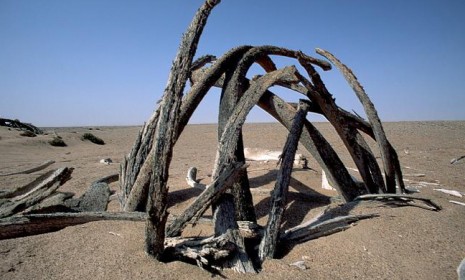The 'mysterious' whale graveyard discovered in a desert
Scientists play detective after 20 "perfectly intact skeletons" of ancient sea mammals are found thousands of feet away from the Pacific Ocean

A free daily email with the biggest news stories of the day – and the best features from TheWeek.com
You are now subscribed
Your newsletter sign-up was successful
How did more than 75 whale fossils turn up in the middle of Chile's Atacama Desert — one of the world's driest? That's the question puzzling a team of scientists from the Smithsonian Institute, who discovered the "mysterious" whale graveyard over a half-mile away from the ocean. A guide to this surprising case:
What exactly did scientists find?
Dozens of ancient whale fossils, some at least as big as a bus, says the Associated Press. At least 20 "perfectly intact skeletons" were discovered. The bones were found side-by-side on a strip of road "the length of two football fields," suggesting that all of the whales died around the same time.
The Week
Escape your echo chamber. Get the facts behind the news, plus analysis from multiple perspectives.

Sign up for The Week's Free Newsletters
From our morning news briefing to a weekly Good News Newsletter, get the best of The Week delivered directly to your inbox.
From our morning news briefing to a weekly Good News Newsletter, get the best of The Week delivered directly to your inbox.
What kind of whales were they?
Among the remains — estimated to be between 2 million and 7 million years old — are adult and juvenile baleen whales, a walrus-whale, an extinct species of sperm whale, an extinct species of dolphin, and possibly the remains of a seal or sea lion. The site is "remarkable" for its unparalleled "diversity," says Nature.
How did the animals end up there?
It's unclear. Some theorists suggest that a mass beaching — in which whales swim onto land and die there — occurred millions of years ago when the desert wasn't as far from the Pacific Ocean as it is today. More likely, says lead Smithsonian researcher Nicholas Pyenson, the area was once a "lagoon-like environment" that somehow became closed off from the open ocean. The whales either died when the lagoon dried up, or when a natural disaster (such as an earthquake or landslide) sealed them off from the sea.
A free daily email with the biggest news stories of the day – and the best features from TheWeek.com
Have scientists found other whale graveyards?
Yes, in areas like Peru and Egypt. The specimens found in the Atacama Desert, however, are unique because of their "staggering number and beautifully preserved bones," says the AP.
Sources: Associated Press, Nature, Third Age
-
 Switzerland could vote to cap its population
Switzerland could vote to cap its populationUnder the Radar Swiss People’s Party proposes referendum on radical anti-immigration measure to limit residents to 10 million
-
 Political cartoons for February 15
Political cartoons for February 15Cartoons Sunday's political cartoons include political ventriloquism, Europe in the middle, and more
-
 The broken water companies failing England and Wales
The broken water companies failing England and WalesExplainer With rising bills, deteriorating river health and a lack of investment, regulators face an uphill battle to stabilise the industry